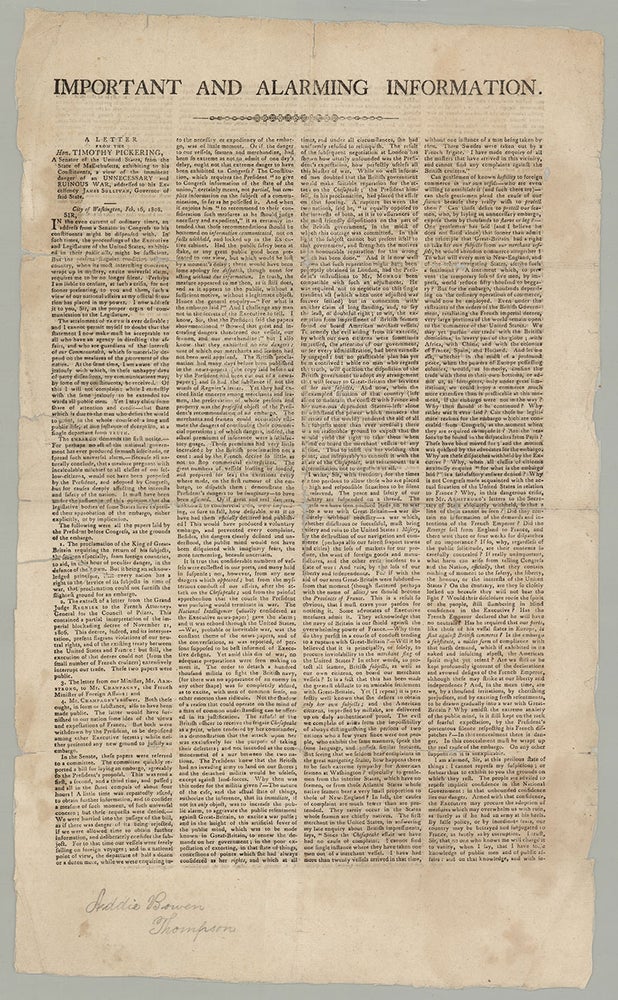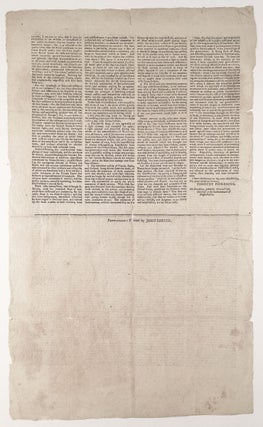Important and Alarming Information. A Letter from the Hon. Timothy Pickering, A Senator of the United States, from the State of Massachusetts, exhibiting to his constituents, a view of the imminent danger of an unnecessary and ruinous war, addressed to his excellency James Sullivan, Governor of said State. City of Washington, Feb. 16, 1808.
Providence, Rhode Island: Printed by John Carter, 1808. Broadsheet, 31 x 52 cm. Reinforced on verso with transparent tissue. CONDITION: Light chipping at margins and small tears along old folds, light dampstaining, several small losses to the text. A rare and compelling broadsheet publication of a letter by Senator Timothy Pickering opposing President Thomas Jefferson’s Embargo Act of 1807. Timothy Pickering (1745–1829) was a Massachusetts statesman and Federalist who served as the third U.S. Secretary of State under Presidents Washington and Adams. Here Pickering writes as a Senator from Massachusetts in response to Jefferson’s 1807 Embargo Act in a letter to James Sullivan, Governor of Massachusetts. Through the Act, Jefferson had sought to respond to British and French molestation of U.S. merchant ships carrying cargo to warring European nations during the ongoing Napoleonic Wars. The general embargo was precipitated by violations of America’s neutrality when these vessels were seized as contraband of war by Europeans during the Chesapeake–Leopard affair. Jefferson retaliated with commercial warfare, attempting to bring economic hardship upon Britain and France. However, the embargo turned out to be a failure both politically and economically—and ended up inflicting serious harm on the U.S. economy, especially in New England. The issue provoked much protest and increased support for the Federalist Party. While the embargo ended on 1 March 1809, tensions with Britain would continued to grow in the lead-up to the War of 1812. As evidenced by this in-depth letter, Pickering was a strong opponent of the embargo; he begins by remarking that there is “perhaps no act of the national government has ever produced so much solicitude, or spread such universal alarm.” Pickering cites the act’s opposition by various States, despite the fact that it was “proposed by the President and adopted by Congress for the interests and safety of the nation.” He spells out the four grounds for the embargo laid out by Jefferson for Congress; however, he notes that “[w]e were hurried into the passage of the bill, as if there was danger of its being rejected, if we were allowed to time to obtain further information, and deliberately consider the subject.” Pickering discusses in great detail the events surrounding and leading up to the embargo—and the ensuing fallout. He concludes his letter thus: “I have undertaken to communicate these details; with the view to dissipate dangerous illusions; to give to my constituents correct information; to excite enquiry; and to rouse that vigilant jealousy which is characteristic of Republicans, and essential to the preservation of their rights, their liberties, and their independence.” OCLC records just two copies.
Item #5309
Price: $1,750.00



